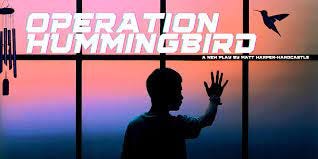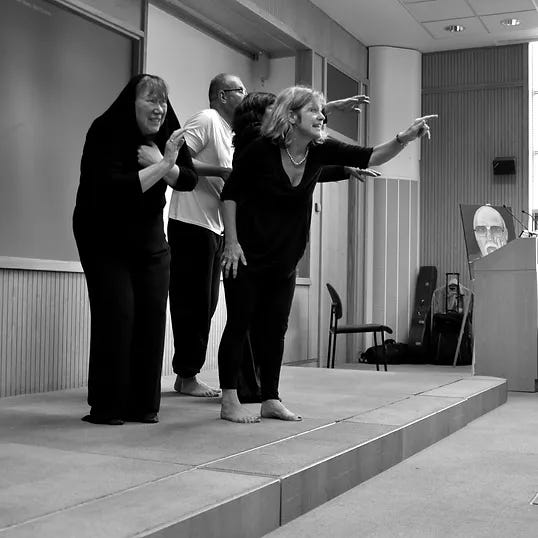#6 A Living Conversation
Use your audience...
The audience is the most revered member of the theater. Without an audience, there is no theater. Everything done is ultimately for the enjoyment of the audience. They are our guests, fellow players, and the last spoke in the wheel which can then begin to roll.
Viola Spolin
The unique quality of live theatre as compared with TV, film and audio is the (hopefully!) dynamic relationship between performer and audience. It is required that, in the moment, the actor/improviser adjusts their performance to their audience just as surfer might with the waves that support and carries them. Skilled performers might even turn against the ‘waves’ of the audience if they know they need to take the performance elsewhere. Comics, for example, might move swiftly through laughter; quelling an inappropriate or unwanted laugh for the sake of a better moment soon to come. The audience themselves might signal with silence or restlessness that the performers onstage have not successfully created an atmospheric moment thus giving the performers an opportunity to adjust and recreate the desired mood. A good live performance is a two-way relationship in which both parties give and take from each other.
(photo credit: Gareth Buddo/York Explore from my 2023 improv show Stuff & Nonsense)
The word audience has its roots in the latin ‘to hear’. This unfortunately implies that an audience are passive listeners. In the worst kind of theatre this is sometimes what the audience are relegated to. They bear witness but have no agency. I remember seeing a flawless production of the musical Mary Poppins but was left with the rather empty feeling that had I not been there it would have made no difference to the skilled performers whatsoever. A performance that is responsive to its audience has a special kind of atmosphere; which is why amateur work often has a more engaging quality to it. The amateur actor cares deeply about who has come to see them in what is usually a very limited run. They are more aware and attentive to their audience. Those trained in clowning know that central to this art form is the cultivation of the clown-audience relationship. Clowning focuses on the audience as an energetic platform for the work onstage. Sometimes actors and improvisers focus entirely on their relationship with their inner feelings, or on the text, or on the jokes or on their scene partners, leaving no room for an audience to inform the performance. In my second blog I mentioned Keith Johnstone who always put the audience at the centre of the theatre he created. He much admired British wrestling calling it the ‘theatre of the working class’. In reaction to much of the dry and dusty theatre of the establishment (which often was about dutifully listening to well-spoken classical verse) his work was about inviting the audience to raucously co-create with the performers.
In a blog about the ‘liveness’ of theatre it might be strange to say that this month it was during a festival about grief that I saw two shows where the audience played a lively part in proceedings. The first show On Loss was performed by Playback York. The show invited audience members to talk, through interview, about various griefs and then have these stories ‘played back’ to them by the performers in various abstract ways.
This was a stripped bare production with few props and the aid of a musician yet it had a profound affect on the people who volunteered their stories. There was clear catharsis, delight and gratitude from those who felt represented onstage. The most powerful moments were not so much in the playback performance but in seeing the effect the performance had on those audience members whose stories were given a platform. It stirred in me some stories of my own and after the show myself, and the people I was with, found ourselves telling our own stories to each other. The second show I saw was Next Door But One’s Operation Hummingbird at a local library. This was a more conventional production in the sense there was no direct audience participation and yet the skilled performers and direction allowed a great deal of space between the lines. The performance was filled with beautiful and evocative silences created and sustained with the rapt audience. The moods of fear, doubt, anger, sadness and hope were not just played to the audience they were made with the audience. Fortunately, there is still time to experience (co-create?) this show albeit in a much bigger venue. To catch the fleeting Operation Hummingbird head to York Theatre Royal this week on the 24th and 25th May.
Treat your audience like poets and geniuses and they'll have the chance to become them.
Del Close
As writers, performers and improvisers we should do more than expect our audiences to simply listen. Perhaps, instead, we should invite them to co-author our performances and keep each night of a show entirely unique.
Making A Scene: Spaces
For Writers
Time: 15 minutes - 60 Minutes
Tools: A timer. Something to write with. Pen, Pencil, Phone, Typewriter
Instructions: Write a one page scene. A two-hander will be quickest. Don’t think too much about it. If you’re stuck have the scene revolve around a dilemma. Should a character become vegan, or shoot a man, or cheat on their lover.
Now rewrite the scene but use silence, space and sub-text. Provide atmospheric gaps knowing that audiences will fill those gaps with meaning and significance. Do less with your text and expect the audience to do more.
For Improvisers
Time: 15 minutes - 30 Minutes
Tools: A fellow improviser. A space. An audience (all you need is one more person or 30 if you have them). Ideally, your audience will be genuine rather than generous.
Instructions: Play a scene. Ignore your audience as much as possible. Leave no gaps and keep the dialogue as fast as possible.
Then, replay the scenario but use silence and space. Adjust the scene to the responses you get from the audience. If they laugh give them more laughs. If the scene is tense then increase the tension. Both lead and follow the audience.
You will know if you are successful because the first scene will be very swift, short and unsatisfying. The second will run long and feel thrilling.
This Week’s Useful Thing
The renowned teacher of clowning, Christopher Bayes, talks about the relationship between performer and audience as a ‘living conversation.’ There is an interesting interview here. If you’re not up for watching the whole thing skip to about 7 1/2 minutes in.
I also wholeheartedly recommend his book Discovering the Clown.
…discovers the audience…If the actor can find a way to embrace the scale of this discovery, and live in that place of vulnerability, a kind of beautiful suspension and readiness, a state of alert, physical listening can be found. The actor has made room for the clown. The world is now a playground for the clown and the audience is the first friend or playmate.
Christopher Bayes - Discovering the Clown
Paul’s Plugs
Here are some links to stuff I have made or am making:
Shattered
So my tribute to The Twilight Zone lands in a few days. Shattered plays at York Theatre Royal on Thursday 25th May at 7.00. I hope to see some of you in the audience as we support the actors in making it a unique night.
Innovating
I had a blast writing this and it was wonderful to play in the archives of York Explore - so many hidden stories there! In celebration of Local History Month the drama is back and free for you to listen to!
Inspired by the history of the City of York’s coaching inns, INNovating is a three-part audio drama that evokes the sounds and stories of these vibrant places of hospitality for travellers in the 1820s, stopping off on their journey along the Great North Road.
This free audio drama is a binaural experience, best listened to through headphones.
The first 15 minute episode can be listened to on Friday 5th May with the remaining two episodes dropping on Friday 12 and 19 May. Go plug in!
For more information to to www.innovating.co.uk
If Walls Could Talk
I was commissioned to write some filmed and audio monologues for Fairfax House in York as part of the brilliant If Walls Could Talk exhibition. The mini-dramas explore how Lady Ann Fairfax was demonised for her faith, her gender and her struggles with mental health; much to everyone’s surprise she was far less fragile and far more capable than people imagined. It runs until November.
Farewell
Several wise and brilliant friends have introduced me to the Australian sit-com Colin From Accounts. I’m glad they did because it’s giving me a lot of joy. Running outdoors in Spring is also pretty great. I used to use music but I’ve taken the earbuds out and listening to the bird song is actually quite refreshing and keeps me much more present. I just need to keep up with the hay fever tablets…
I hope you too fare well







